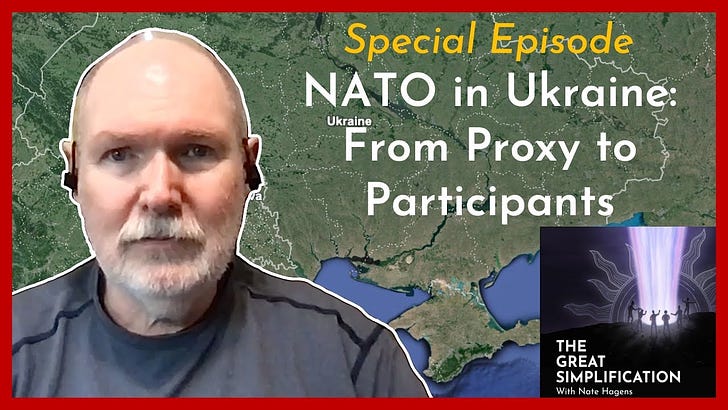Today, in a special release, risk analyst Chuck Watson returns to discuss the current state of the conflict in Ukraine and the potential for escalation. With the conflict centered around resource control, cultural clashes, and political posturing - will European countries now push to keep the United States involved with the conflict?
Chuck Watson has had a long career in military and intelligence work, with a specialty in natural and human made disaster modeling. He worked for the US Air Force, was an attache to US Ambassadors to the Middle East Robert McFarland, and Secretary of Defense Donald Rumsfeld as a Soviet expert. Chuck has worked as an advisor to the military for over four decades with a particular emphasis on big data, open source intelligence, with an emphasis on the Soviet Union and Russia. Chuck is also the founder and Director of Research and Development of Enki Holdings, LLC, which designs computer models for weather phenomena.
Each sentence/paragraph in this conversation could have been unpacked in a 30 minute conversation of it’s own. The situation is highly nuanced, contextual and complex, but the delta between the Western public narrative and our reality continues to narrow.
Most importantly, are there still peaceful, stable options that maneuver us away from open war and what would those mean for the rest of the world and our future?
In case you missed it…
This past Wednesday’s guest was Lyn Alden, whose biophysically rooted analysis of macroeconomic patterns reveals hidden insights into the macro risks of today’s global economy. In this episode, we discussed how energy and technology have shaped our monetary system and current financial trends and what that might mean for the coming decade. Is it possible to rejigger our systems and innovate more biophysically aligned tools to enable a smoother transition into a future with a lower energy throughput?
If you appreciate The Great Simplification podcast…
Be sure to leave a review on your preferred podcast platform! Leaving reviews helps the podcast grow, which helps spread awareness of our systemic situation from experts in ecology, energy, policy, economics, technology, and community building so that we can better understand - and respond to - the challenges of the coming decade.
The Great Simplification podcast is produced by The Institute for the Study of Energy and Our Future (ISEOF), a 501(c)(3) organization. We want to keep all content completely free to view globally and without ads. If you’d like to support ISEOF and it’s content via donation, please use the link below.






I enjoyed and learned much from Chuck and Lyn. It's pruning time on the farm and your podcast is an easy companion that shortens the tedious chores. Thank you.
Nate, I hope you don't let the pushback in the youtube comments get to you. Anyone who threatens to stop listening to you because they disagree with Chuck Watson either has been listening with a biased ear all along, or will come to their senses and keep listening or watching. I'm sure Mr. Watson has access to information that neither you nor any of your listeners have access to. The cloaking of information makes it essentially impossible for a listener or viewer to fact check anything your guest says. Do you or any member of your staff have that ability? Do you have relationships with journalists who have press credentials to break through closed channels to do fact checking?
That said, I do hope that you can find more military and disaster risk experts besides Mr. Watson, who can either oppose, confirm, or add nuance to Mr. Watson's views. Since I found your podcast more than a year after you got started, I went back and listened to every single episode, and as far as I can recall, Mr. Watson is your only guest in his area of expertise.
A similar problem exists with your geology guests. While I am a big fan of both Art Berman and Simon Michaux, they are both difficult and, at times, impossible to fact check. I subscribe to Mr. Berman's newsletter and read as much of his writings as I can. Sometimes I can crosscheck his claims with, say, the EIA, the IEA, the DOE, the IER, the UN, the EU, or IRENA, but sometimes I come up empty handed. Dr. Michaux is harder to follow, and his area of expertise is different from Mr. Berman. Can you find more geologists to have on your show, who might have different perspectives on energy sources? How about a physicist who can explain the relationships between the physical notions of energy, force, work, and power, and how various resources fit into those definitions? For example, "energy" refers to the ability to do work, that is to exert enough force to cause physical displacement over some distance, but often what matters more is power, the amount of energy transferred per unit of time. Furthermore, your experts completely overlook small scale energy generation, such as community biogas digesters, compost based water heating, direct solar heating, evaporative passive cooling, micro-hydro, solar cooking, small scale and byproduct hydrogen production, and stationary energy storage without mined minerals. Researchers such as The Low Technology Institute (Scott A. J. Johnson) in Cooksville, Wisconsin, The Poor Prole's Almanac, whose staff go by a first name only basis, and Low Tech Magazine by Kris De Decker all offer energy expertise for the post-simplification economy.
Thank you for telling the truth, for giving voice to voices we otherwise don't get to hear, and for modeling what it is to be a lifelong learner.